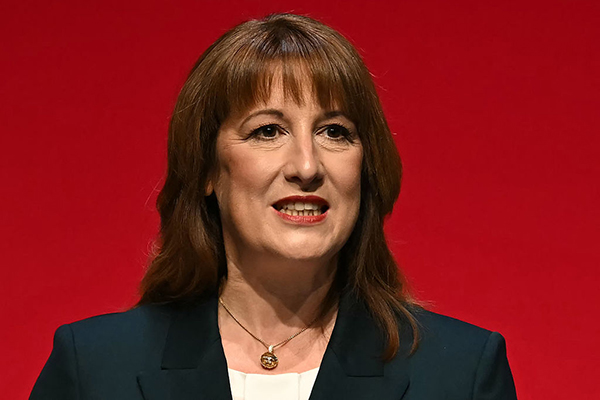Autumn Budget preview: unpacking the pension tax-free cash saga
As rumours about tax reforms continue to swirl, Craig Rickman runs through the recent developments and flags what to consider before accessing pension lump sums.
2nd October 2025 14:33
by Craig Rickman from interactive investor

Chancellor Rachel Reeves during the Labour Party conference in Liverpool in September 2025. Photo: Paul Ellis/AFP via Getty Images.
We’ve somehow reached a period where rumoured changes to the pension tax system risk causing as much harm to our finances as any actual reforms.
Throughout the past 12 months, investors who diligently manage their retirement affairs to grow and preserve their wealth have been pummelled by reports about the future of pension tax-free cash.
- Our Services: SIPP Account | Stocks & Shares ISA | See all Investment Accounts
The government is apparently weighing up cuts to the current maximum allowable, which for most people is 25% of your total pension savings, capped at £268,275.
The speculation ultimately proved wide of the mark at the 2024 Autumn Budget, with Chancellor Rachel Reeves opting to leave the existing regime alone, much to savers’ relief.
But as this year’s Budget, set for 26 November, draws closer, the rumour mill is once again cranking up with pension tax-free cash back in the eye of the storm, despite Reeves telling Sky News on 3 November last year, “I'm not coming back with more borrowing or more taxes.” However, a great deal has changed in the past 11 months, forcing Reeves to change tack.
While most investors recognise that knee-jerk moves in response to pre-Budget speculation is best avoided, this is often easier said than done. People are concerned the reports might hold some truth and, given their volume and frequency, this is understandable. Keeping tax bills low in later life is key to make the most of your wealth, hence why tax-free cash is such a cherished component of the retirement savings framework.
What’s more, there are fears the government’s proposal last year to bring pensions into the inheritance tax (IHT) net from April 2027 may have marked the start of a broader pension tax raid.
- What to consider before gifting your pension to swerve IHT
- Is it possible to give away my pension savings to avoid IHT?
The numbers illustrate the profound impact the speculation is having on saver behaviour. interactive investor research found that tax-free pension withdrawals were 61% higher in August 2025 than the same month last year. The Financial Conduct Authority’s (FCA) latest retirement income market data tells a similar story, with withdrawals leaping 63% to £18.3 billion in 2024-25.
This trend can be explained, in part, by more people accessing their savings and either spending or gifting the money to beat the forthcoming IHT reforms. Passing away with a hefty pension after 6 April 2027 could lump your heirs with a sizeable tax bill, as well as an administrative maelstrom.
However, the rumoured cuts to tax-free cash are having an equally significant impact, with investors worried that if they don’t hook the money out now, they might lose out in a couple of months’ time.
We know that some of those who made tax-free pension withdrawals this time last year regretted the decision, something that Reeves herself flagged earlier this week. And HMRC recently confirmed that once you’ve made a tax-free withdrawal you can’t reverse the decision.
Let’s explore what’s been going on with pension tax-free cash in greater detail.
Reeves urges people to wait until Budget
Earlier this week, BBC Radio Four quizzed Reeves about the flurry of pre-Budget rumours. The chancellor’s reply was firm, claiming that people are “talking rubbish” and describing many of the reports as “very irresponsible”.
Reeves went further: “People were told last year that I was going to do this, I was going to do that, and people made decisions with their money, that were often irreversible decisions, and I would urge people to wait until that Budget and not listen to people who claim to know what is in my Budget.”
Whether this will bring the rumour mill to a grinding halt and assuage savers’ concerns that a pension tax grab is firmly off the table, is another matter. Anything short of the government explicitly stating tax-free cash won’t be reformed leaves room for speculation to sneak in.
HMRC issues warning around pension recycling
Other recent developments highlight why it’s so important to think carefully before drawing your tax-free cash.
According to reports in the Telegraph a couple of weeks ago, HMRC has reaffirmed its stance from December 2024 that 30-day cooling-off rights don’t apply when making tax-free withdrawals as you’re not buying a financial product. Simply put, it’s a one and done choice. You can’t take tax-free cash ahead of the Budget, wait to see if anything changes, then reverse the decision if you later regret it.
- Retirement case study: how I manage a £2.5m SIPP and ISA portfolio
- Is the 4% rule still reliable as a safe withdrawal strategy?
Since then, the saga has taken a further twist. Once again, according to the Telegraph, HMRC has warned that savers who removed tax-free cash and later changed their minds, could be hit with “unauthorised payment tax charges” if the pension recycling rules haven’t been met. These rules essentially limit how much withdrawn pension tax-free cash you can return to your savings, with charges of up to an eye-watering 70% for breaching them.
Needless to say, should HMRC pursue savers who made tax-free withdrawals on the understanding they could undo the decision within 30 days, the backlash would be ferocious. Pension rules, particularly when accessing your savings, are fiendishly complex in parts. Slapping savers with heavy penalties if they unwittingly tripped up, for whatever reason, would be deeply harsh.

What to consider before making a decision
So, if you have an undrawn tax-free cash entitlement and are thinking about what to do, how should you approach this key decision? Let’s look at your options.
The standard guidance to avoid making important financial decisions in response to speculation very much applies here. As noted above, once you’ve made a tax-free withdrawal, you can’t put the genie back in the bottle. So, make sure you take your time, weigh up the pros and cons, and factor in your personal situation.
We should note that for some people, taking the maximum tax-free cash now might be a sensible thing to do. It essentially boils down to whether you have a purpose for the money. Common reasons include clearing debts (especially high interest ones), paying for big-ticket expenses, supporting younger generations financially, or simply seeking ways to reduce the value of your estate given pensions will no longer be IHT exempt in around 18 months’ time.
When it comes to the drawbacks of removing all your tax-free cash, all withdrawals on the remaining pot will be taxable, which could pose a problem, particularly if you need to access a large sum at some point. What’s more, there can be advantages to taking tax-free withdrawals gradually over time. With an uncrystallised fund pension lump sum (UFPLS), 25% of your withdrawal is tax-free, while the other 75% is taxable, which can be an effective way to manage your income tax bill every year.
Among the other potential downsides, you'll forfeit the possibility of a larger tax-free cash amount down the line. That’s because if you keep your pension invested and the value grows, any unused tax-free entitlement will follow suit. Your savings could, of course, head the other way should a market slump arrive, but over long periods stock prices tend to rise.
A further pitfall is that your money will be removed from a tax shelter, meaning you could lose a portion of any future growth and interest to HMRC. One way to combat this, provided you have no plans to use the money immediately, is to shift the cash to another tax wrapper, such as an individual savings account (ISA). Bear in mind that the maximum an individual can pump into ISAs every year is £20,000 so if your tax-free cash withdrawal is sizeable, you might not be able to commit the full amount straightaway.
Something be aware of is that if you’ve only made tax-free withdrawals from your pension, you won’t trigger the money purchase annual allowance (MPAA). This reduces what you can pay into pensions every year and receive upfront tax relief from £60,000 to £10,000.
But if you’ve made a flexible and taxable pension withdrawal, using either drawdown or UFPLS, the MPAA will take effect. This is important to know if you need to access your pension for any reason and plan to beef up your savings either now or at any point before you reach age 75.
Keep the bigger picture in mind
The reality is we don’t know whether the government will make changes to tax-free cash later this year. And if they were to, we don’t know when the reforms will take effect, or if arrangements will be put in place to protect savers who are impacted.
I’m sure many share my hopes that the pension tax system is left alone on 26 November. But if you’re wondering whether to stick or twist with your tax-free cash ahead of the Budget, remember that what we’re hearing is only speculation at this stage and only make decisions with your long-term future front and centre.
These articles are provided for information purposes only. Occasionally, an opinion about whether to buy or sell a specific investment may be provided by third parties. The content is not intended to be a personal recommendation to buy or sell any financial instrument or product, or to adopt any investment strategy as it is not provided based on an assessment of your investing knowledge and experience, your financial situation or your investment objectives. The value of your investments, and the income derived from them, may go down as well as up. You may not get back all the money that you invest. The investments referred to in this article may not be suitable for all investors, and if in doubt, an investor should seek advice from a qualified investment adviser.
Full performance can be found on the company or index summary page on the interactive investor website. Simply click on the company's or index name highlighted in the article.
Important information: Please remember, investment values can go up or down and you could get back less than you invest. If you’re in any doubt about the suitability of a Stocks & Shares ISA, you should seek independent financial advice. The tax treatment of this product depends on your individual circumstances and may change in future. If you are uncertain about the tax treatment of the product you should contact HMRC or seek independent tax advice.